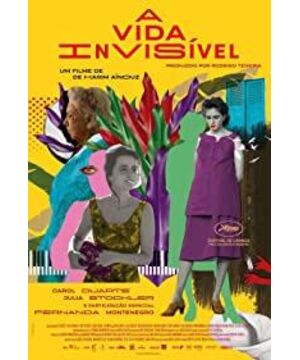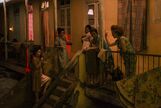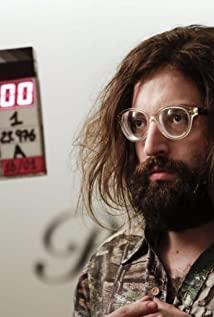This screening was initiated by the official account "Yuan Zhuo", and it was screened online on [Wowo APP]. Click on the original link below to view the details of the festival. You can also follow our official account to get more news and information about future exhibitions. Original link: [Women Film Festival 06] Those women who were replaced to speak qq.com
Click on the original link to read, the layout is more comfortable
The author of the article Sanbei Mao [Official Account: Yuanzhuo] Since the birth of the film industry system, it has naturally accompanied the patriarchal culture to form the underlying logic. Laura Mulvey’s classic exposition no longer needs me to say more. The patriarchal narrative of the film has always occupied the mainstream of the film narrative. With the awakening of female consciousness and the popularity of the global women's liberation movement, the proportion of female directors has increased significantly in the labor structure of the entire film industry, but on the whole, female directors are still a minority in the film industry. This seems to have formed a contradictory situation. On the one hand, female directors do face difficulties in the film industry. On the other hand, a large number of so-called "feminist films" or "female films" have sprung up in the film market. Whether it's film festivals, theater chains, or streaming media, there are endless films that tell about women, show women's life experiences, and discuss women's survival issues. Obviously, in the capital's pursuit of profit, another illusion of equality has been created. This illusion of equality exists in many descriptions of minority groups and subcultural groups-women seem to be no longer the "other." But the problem is that it is difficult for women to narrate themselves. Those topics about women are still being narrated by male directors in the film industry, and men are required to speak on their behalf. In fact, this is not a problem that only exists in the film industry. Women need to use male narratives to permeate the structure of patriarchal culture. And this movie "Invisible Woman" is about a story about a female voice blocked under a male narrative. The most obvious manifestation of this is the symbol of the letter. It also symbolizes the circulation and interruption of dialogue. In fact, the starting point of the symbol that constitutes a letter comes from the interruption of communication. As the first male violent man in the film, his father distorted the words and information of communication, which caused the tragedy to begin, and the dialogue between the two sisters was always "misread". As the medium of communication between the two sisters, letters are continuously divided by male characters. The dialogue between women cannot be reached directly, but must be reviewed and decided by men. As a result, male characters have become the sole center of discourse power in the narrative of the entire film, while women’s discourse power has been put on hold. At the end of the film, the box full of letters from Jeddah symbolizes the monopoly of men's right to speak. Only men in the family know the password to open this box, which also means that in this patriarchal family, only men have the right to narrate and narrate. What is held in that box is the long-repressed and closed words of women, whose expressions cannot be told or expressed under the restraint of men. The person is told. And when Ulidice read Jeddah's letter, the broken dialogue and communication, the barrier between emotions, finally reconnected in the broken time and space. But this also allows the film’s patriarchal complaint to be further improved in expression-women’s expression can not only be blocked by men, when the only son who knows the password opens the box, it also means that smooth communication between women also comes from men. license. In this sense, the women in the film are completely under the control of patriarchy. What they have lost is not only the right to speak, but more importantly, they have lost their autonomy. When it comes to autonomy, we must also talk about the patriarchal complaint about the film. I don't think the film is a fierce and arrogant expression, but instead presents a more convergent and subtle way of expression. The basic narrative of the film is based on women's pursuit of self-awareness. In this context, the control of patriarchy is not like "Mysterious Superstar", which makes the violence of patriarchy extremely obvious. On the contrary, the patriarchy of the film is pervasive and internalized. The main task of the two sisters is to pursue the life they want. Uli Dixie wants to be admitted to the Conservatory of Music to be a pianist, while Jeddah wants to pursue the love of her life. This seemingly common and common "twin flower" plot structure forms a huge tension with the reality blocked by patriarchy. The overall narrative of the film has in fact been focused on the two sisters' efforts towards an ideal life, and there is not too much and straightforward depiction of patriarchal violence. But patriarchal violence has become the biggest and almost the only hindrance of the two. This patriarchal violence provided a devastating impact and an inescapable predicament for the ideal life of the two sisters. At every turning point in life, at every moment when the two sisters regain their strength, patriarchal violence comes like a ghost as expected. Regarding destruction, what impressed me the most were the scenes of Yuri Dixie after her wedding. In Eurydice’s marriage, sex and piano form a set of symbolic opposites. The piano naturally represents Eurydice’s pursuit of self-worth, and sex—to be precise, the husband’s sexual requirements, constitutes a metaphor of patriarchal violence. In the scene on the wedding night, the film gave a clear close-up of the husband's genitals, which in fact shows that the significance of marriage to Eurydice lies in entering the control of patriarchy. The husband’s corpse has become the most obvious symbol of the patriarchal violence machine. The dramas of sexual behaviors that follow from this also point to the destructive exploitation of women by the patriarchy, forming a series of patriarchal exploits. Violence and control behavior. Then piano and sex-the conflict between self-seeking and patriarchal violence is most obvious after marriage Yuli Dixie sits at the piano practicing the piano to prepare for the exam, while her husband asks her for sex scenes. In that scene, the piano and sexual behavior appeared in the same space at the same time. Her husband deprived her of her choice of “practicing the piano” for her sexual behavior. In fact, it was a very straightforward expression of the exploitation of women by patriarchy. Lidice's ideal crush. And when Eurydice’s request to "not shoot inside" was ignored, she pushed her husband away and sat on the toilet to wash her genitals. In the mirror image of the last shot, we saw her false reflection and bewildered and angry face. In this scene, the three symbols of piano, sex, and quiet night appear together, which together constitute the complete process of patriarchal violence. As a female, Yuli Dixie did not escape the fate of being controlled by the male power, but was destroyed by the violent machine to destroy her ideal and independent identity. Of course, the film also constructed another non-patriarchal family structure. It is the family of Jeddah. After being abandoned by patriarchy and deceived by her husband, she began to live an independent life, cherishing the past with another woman, and reconstructing a non-blood and non-patriarchal family. This perspective is not only saying that "women can help women" position, but also showing us a family model that can live happily without a man, and it is also the tenacious vitality of a woman. From the expressions of her grandchildren, it can be seen that Jeddah is full of optimism and positive attitude towards life, and also has her own unique "philosophy" about facing life with humor. For Jeddah, she finally had the right to narrate herself later in her life, instead of being replaced by men. family. This perspective is not only saying that "women can help women" position, but also showing us a family model that can live happily without a man, and it is also the tenacious vitality of a woman. From the expressions of her grandchildren, it can be seen that Jeddah is full of optimism and positive attitude towards life, and also has her own unique "philosophy" about facing life with humor. For Jeddah, she finally had the right to narrate herself later in her life, instead of being replaced by men. family. This perspective is not only saying that "women can help women" position, but also showing us a family model that can live happily without a man, and it is also the tenacious vitality of a woman. From the expressions of her grandchildren, it can be seen that Jeddah is full of optimism and positive attitude towards life, and also has her own unique "philosophy" about facing life with humor. For Jeddah, she finally had the right to narrate herself later in her life, instead of being replaced by men.
View more about Invisible Life reviews









